Build a Scalable Sales Engine With AI Sales Agents

Preetam Das
June 16, 2025
17 min

Table of Contents
You are constantly chasing leads that might not even be quality leads, and the ones you have been nurturing for a long time, those old follow-ups just seem to vanish. You’re tied up with endless CRM updates, and it feels like pure data entry. This is something very relatable for anyone who is or has worked in sales. I relate to it since I started as a sales rep.
Now imagine your morning coffee is about to finish, your meetings for the day are already scheduled, your leads are automatically organized by interest level (hot, warm, or cold), and even personalized emails are queued up, tailored to each lead’s stage in the customer journey. What could take you hours is done in just minutes, without you even looking at it once. This is what an AI sales agent is doing, and it’s changing the entire sales process.
What is an AI Sales Agent?
An AI sales agent is a smart system that helps automate the repetitive, time-consuming parts of the sales process, without needing constant supervision or daily input from any human. AI sales agents are designed to act. At the core, these agents run on a mix of machine learning, natural language processing (NLP), large language models (LLMs), and predictive analytics.
But what makes them effective isn’t just the tech. The engine relies on plugging into tools the sales team already uses, like CRMs, data platforms, and communication tools. It pulls data from across these sources, understands what’s going on using NLP and ML models, and then decides what to do next based on goals, rules, and learned patterns.
Some agents go a step further, adjusting mid-flow using real-time data. If a lead goes cold, they might switch the tone, change the channel, or try a new sequence. Just like a rep would, but faster, and across hundreds of leads at once.
Key features of AI sales agents
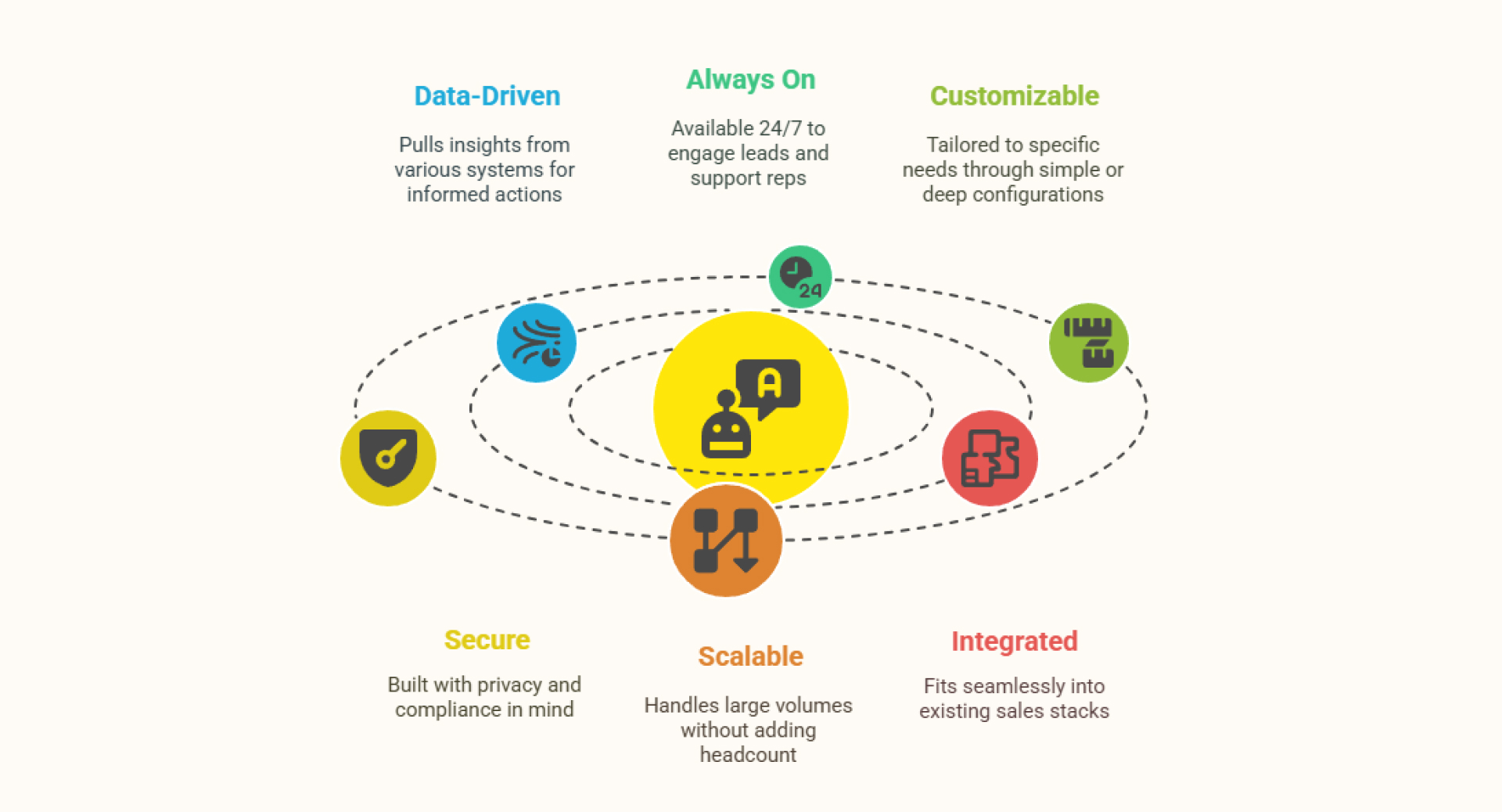
- Data-driven: AI sales agents pull insights from CRM, customer records, and business systems to take informed actions.
- Always on: Available 24/7 to engage leads, support reps, and never miss a follow-up, no matter the time zone.
- Customizable: Can be tailored to your needs, whether through simple setup or deeper low-code/API configurations.
- Secure: Built with privacy and compliance in mind, operating within trusted guardrails (GDPR, CCPA, etc.).
- Scalable: Handle large volumes of leads, outreach, and tasks without adding to headcount.
- Integrated: Designed to fit seamlessly into existing sales stacks like Salesforce, HubSpot, and more.
The role of tools, chatbots, and AI agents in sales
Traditional sales tools like CRMs, dialers, and email automation are useful for managing data and streamlining tasks, but they still depend heavily on human input to drive the process. Chatbots added a layer of automation through direct customer interaction, handling FAQs, capturing leads, or routing conversations. However, most are reactive and follow scripted flows, even with generative AI. They can respond, but they don’t make decisions or manage complex workflows. AI sales agents build on both, combining automation with intelligence. They can act on data, personalize outreach, and support sales teams more proactively, without needing to be guided at every step.
Types of AI Sales Agents
Some AI sales agents take full control of the process without any human input, while others work alongside teams, handling the repetitive stuff in the background. What sets them apart is how much autonomy they have and where they fit into your sales workflow.
1. Autonomous AI sales agents
Autonomous AI sales agents are fully hands-off systems that run independently once configured and don’t wait for instructions. From identifying high-quality prospects to sending personalized emails and scheduling meetings, they do it all without needing someone to oversee each step. Especially useful for high-volume sales teams looking to scale outreach.
2. Assistive AI sales agents
Assistive AI sales agents (also called copilots) work alongside human reps, taking care of the repetitive stuff like logging notes, enriching lead data, and keeping the CRM clean. They don’t lead the sales cycle but provide timely support.
3. AI voice bots/calling agents
AI voice bots or calling agents are purpose-built for handling voice interactions at scale. Whether it’s outbound prospecting or inbound lead qualification, they can conduct natural conversations, answer questions, book meetings, or pass leads straight to a rep.
4. Conversational AI chatbots
Conversational AI chatbots use large language models (LLMs) to carry out real-time conversations that feel more natural than rule-based systems. Unlike old-school bots, they don’t follow rigid scripts; they qualify visitors, answer product questions, recommend next steps, and even schedule demos.
5. Productivity-focused sales agents
Productivity-focused sales agents support the sales process by running in the background, automating workflows, connecting tools, syncing data, and managing repetitive tasks like lead scoring, research, and reporting.
While different AI agents serve different parts of the sales process, platforms like Thinkstack bring many of these capabilities together in one place. Its AI agent builder helps teams engage leads, collect data, personalize conversations, and automate key workflows, making it useful across both customer-facing and internal sales operations. Whether you’re looking to qualify leads, streamline outreach, or support reps with helpful automation, Thinkstack fits right into modern sales stacks.
How AI Sales Agents Work
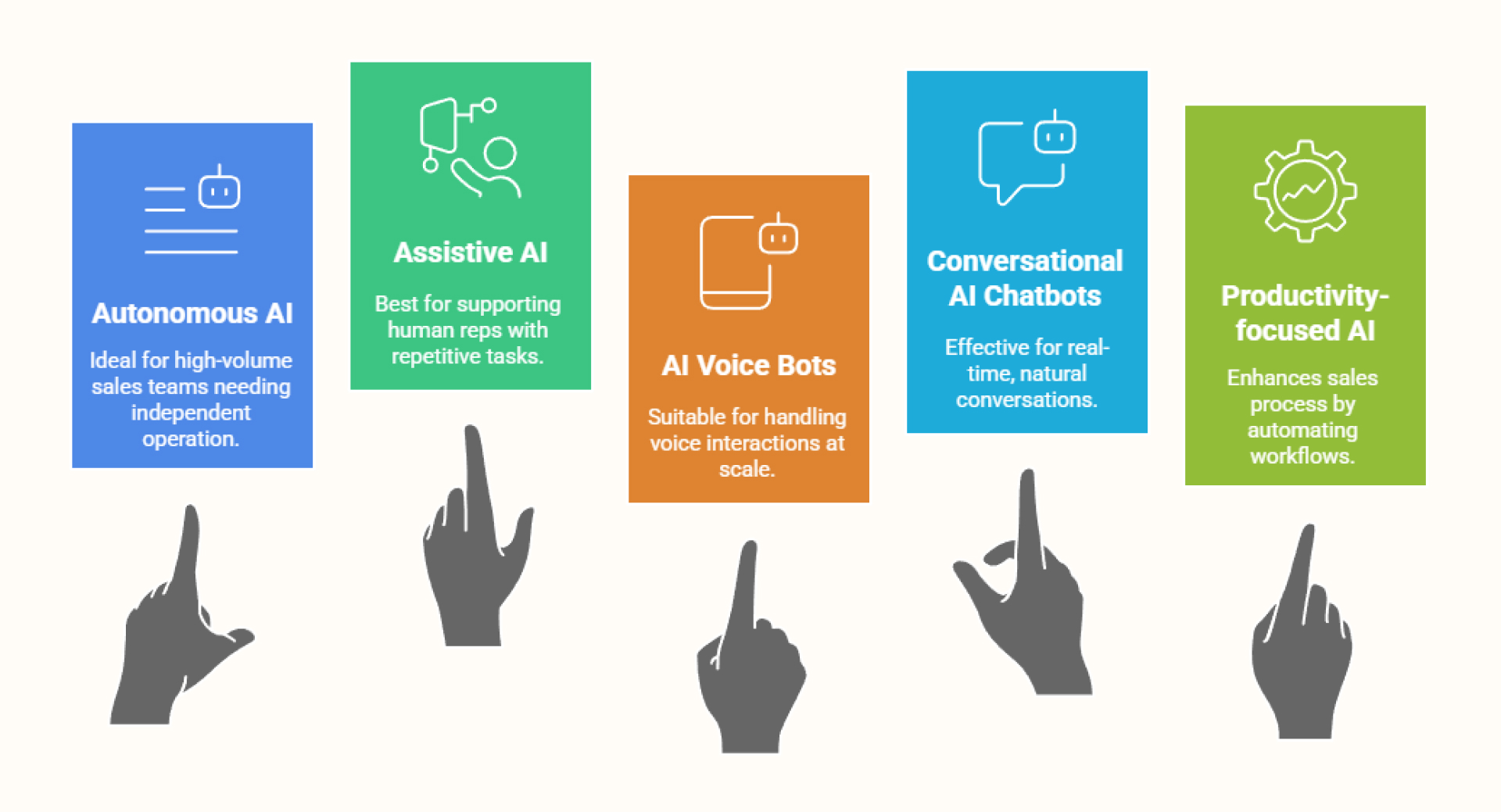
AI sales agents operate through a series of structured steps, using advanced AI technologies to understand, decide, and take action.
1. Connect to your data sources
AI sales agents plug into your CRM (Zoho, Salesforce), email and chat platforms, calendars, and other customer data sources. They pull in everything from contact details and deal history to engagement signals like email opens, replies, or site visits, giving them the context they need to take meaningful action.
2. Process information using AI
Depending on the type, conversational, assistive, or autonomous, AI sales agents use a mix of technologies to understand context, interpret intent, and decide what to do next.
- Machine Learning (ML)
AI sales agents use machine learning to detect patterns from previous interactions, helping them continuously refine responses, actions, and targeting over time. - Natural Language Processing (NLP)
NLP enables AI agents to accurately interpret customer messages, identify sentiment, and recognize intent, making conversations feel more intuitive and context-aware. - Generative AI and Large Language Models (LLMs)
LLMs like GPT-4 empower AI agents to craft natural, brand-aligned replies, whether it's emails, chat responses, or sales scripts, tailored to each customer interaction. - Predictive Analytics
It helps AI agents assess lead quality, anticipate customer behavior, and recommend next-best actions to move deals forward efficiently. - Speech Recognition and Synthesis
For voice-based sales agents, speech recognition and synthesis enable smooth real-time conversations by accurately understanding and responding in natural language.
3. Perform tasks across the sales funnel
Once set up, agents begin executing actions. These tasks are often built as workflows using rules, triggers, and integrations, like pushing lead data into Google Sheets or alerting a rep when a hot lead returns to the site.
- Autonomous Agents
These agents manage the entire sales cycle independently, from identifying qualified leads to sending personalized follow-ups and scheduling meetings, without requiring prompts or oversight. - Assistive Agents
They work alongside human reps by logging notes, enriching lead details, surfacing relevant insights, and even suggesting next-best actions during live interactions. - Conversational Agents
Conversational agents are designed to engage prospects through chat, answer product-related queries, qualify leads based on responses, and trigger actions such as booking demos or sending resources.
4. Learn and improve continuously
AI agents adapt over time through feedback loops. Some also include A/B testing, performance tracking, and real-time sales analytics, helping teams improve without extra manual effort. With every new interaction, they:
- Improve intent recognition and tone matching.
- Adjust timing and message strategies based on past outcomes.
- Refine lead scoring and workflow logic.
- Optimize coaching prompts or suggestions.
Use Cases of AI Sales Agents
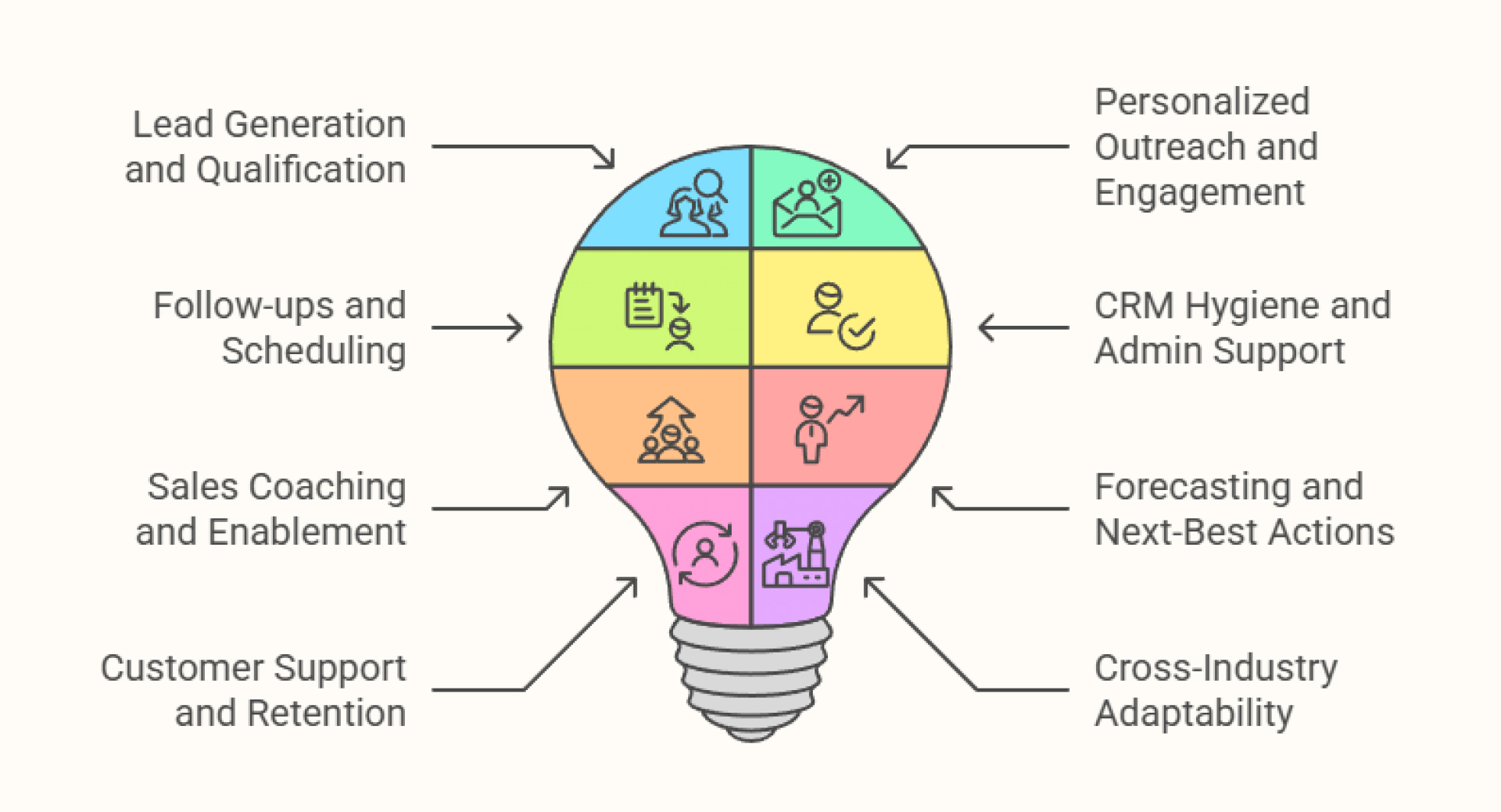
AI sales agents aren’t limited to one task—they span across the entire sales process, from lead generation to customer retention. Here’s where they deliver real, practical value:
- Lead generation and qualification
AI sales agents scan CRMs, websites, and external sources to identify leads that match your ICP, scoring them based on engagement, intent, so teams can focus on the ones most likely to convert. - Personalized outreach and engagement
Automates emails, chats, and follow-ups across channels, each message tailored to the lead’s behavior, interests, and stage in the funnel to keep conversations relevant and moving forward. - Follow-ups and scheduling
Automated workflows summarise meeting insights, ensure timely follow-ups, send reminders, and sync calendars — keeping leads warm and meetings on track without reps needing to chase manually. - CRM hygiene and admin support
Routine tasks like note-taking, deal stage updates, call summaries, and contact enrichment are handled automatically, removing repetitive tasks from your team’s plate. - Sales coaching and enablement
During live interactions, AI can suggest next-best responses, surface key insights, or highlight potential objections. For new reps, it helps accelerate ramp-up with pitch templates, real-time feedback, and personalized coaching tools. - Analytics and next-best actions
By reading patterns in pipeline history and live engagement data, AI can suggest follow-ups, upsells, or messaging tweaks to improve outcomes and reduce risk. - Customer support and retention
After the sale, agents handle answering common questions, collecting NPS or CSAT feedback, and offering renewals, upgrades, or add-ons based on product usage and timing. - Cross-industry adaptability
From B2B SaaS and financial services to e-commerce, healthcare, and real estate, AI sales agents can be configured to match different sales motions, making them a flexible fit across verticals.
Benefits of AI Sales Agents
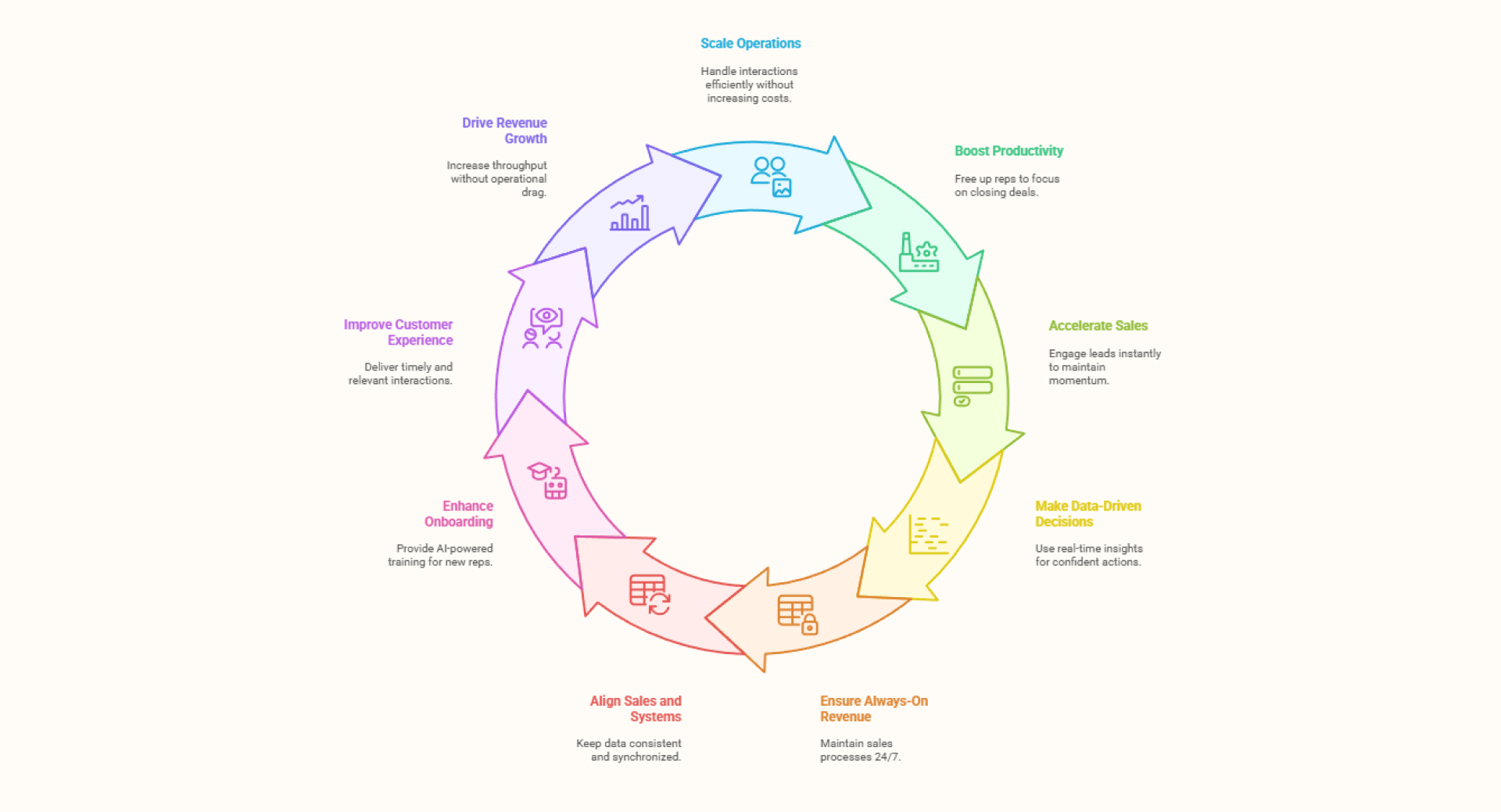
- Operational scale without headcount strain
AI agents can handle thousands of interactions, qualify leads, send follow-ups, and update records without increasing team size or costs. - Higher productivity across the pipeline
By reducing manual tasks, AI agents free up reps to focus on the conversations that actually close deals, driving better performance across the funnel. - Faster speed-to-lead and deal velocity
With instant engagement and timely follow-ups, AI ensures momentum stays high and deals move forward before competitors even respond. - Data-backed decisions at every step
Real-time insights on buyer intent, pipeline health, and forecast accuracy empower teams to act with greater confidence and precision. - Always-on revenue engine
AI sales agents operate around the clock, qualifying leads, responding to queries, and booking meetings 24/7—keeping your pipeline active even outside business hours. - Stronger alignment between sales and systems
CRMs stay clean, messages stay consistent, and data syncs in real time across platforms eliminating silos and improving collaboration. - Improved onboarding and training
New reps ramp up faster with AI-powered pitch scripts, real-time support, and objection-handling guidance that accelerates learning and boosts confidence. - Better customer experience at scale
Timely, relevant interactions build trust and reduce wait times, delivered consistently without needing to hire more staff. - Revenue impact without operational drag
By automating low-value work and increasing throughput, AI agents help teams grow faster without overextending. Businesses using AI agents often report a 50% boost in productivity and a 40% reduction in operational costs, with many achieving full ROI within just 12 months of deployment, making them not just efficient but highly cost-effective.
Challenges of Using AI Sales Agents
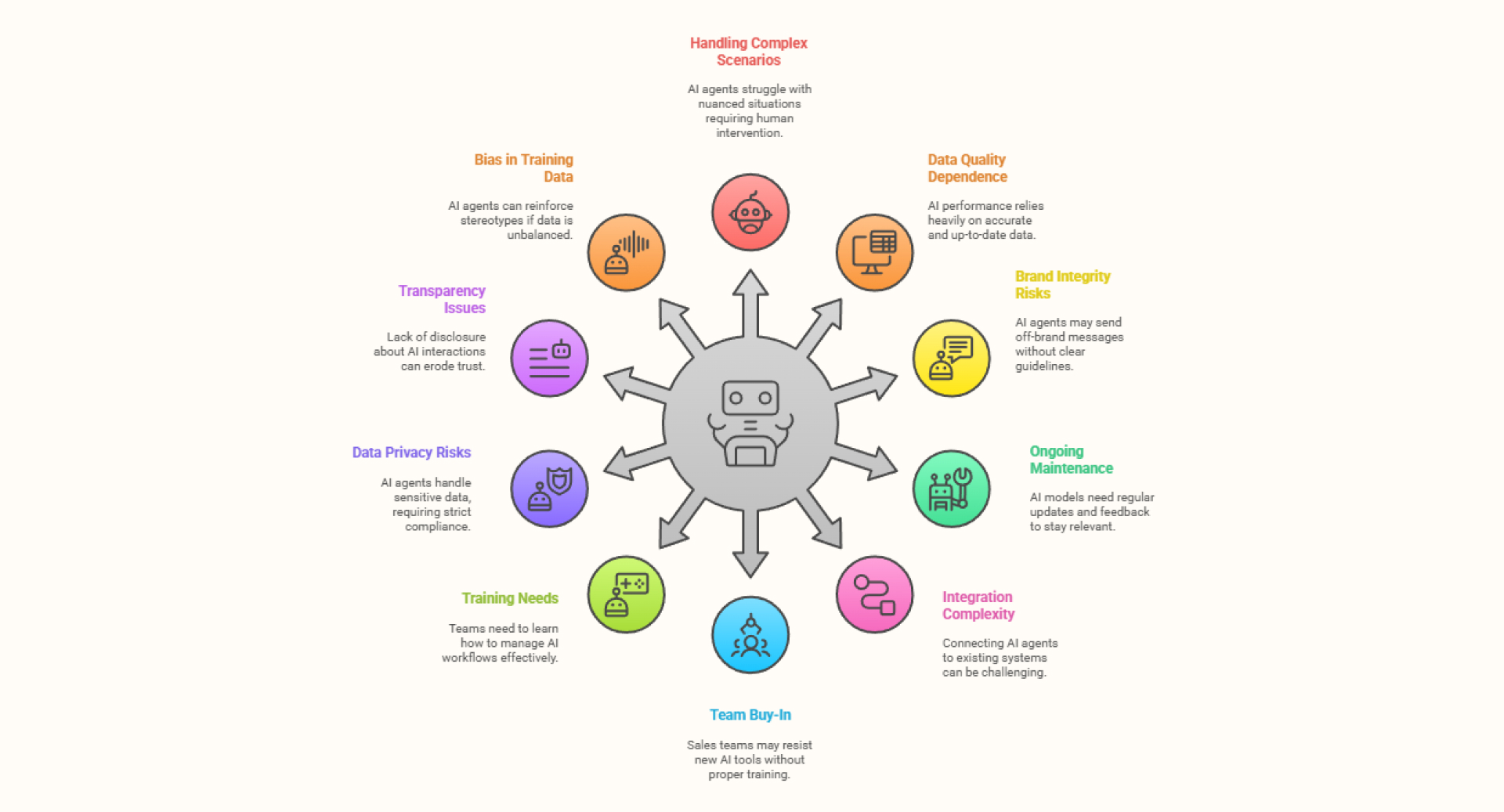
AI sales agents offer significant advantages across the sales funnel, but implementing them effectively comes with its own set of challenges.
- Limited ability to handle complex or emotional scenarios
AI agents work best with structured, repeatable tasks. In emotionally nuanced or unexpected situations, they may fall short, making human intervention essential in high-stakes or sensitive conversations. - Heavy reliance on data quality
Performance depends entirely on the quality of input. If CRM information is messy or outdated, or if the training content lacks relevance, AI agents may deliver inaccurate messages or take misaligned actions. - Risk of off-brand or context-blind actions
Without clearly defined brand voice and context rules, AI agents may send messages that feel robotic, generic, or misaligned. Guardrails, human reviews, and clear tone guidelines are necessary to protect brand integrity. - Ongoing maintenance and oversight
Models need regular tuning, new data, and feedback loops to stay accurate, compliant, and relevant. This includes reviewing logs, updating workflows, and refining intent detection. - Integration complexity during setup
Connecting AI agents to CRMs, messaging tools, and scheduling platforms can be time-consuming, especially for teams without a strong technical foundation. When systems aren’t properly connected, AI agents may struggle to retrieve the data required for accurate, context-aware responses. - Change management and team buy-in
Sales teams may resist new tools, especially if they fear replacement or aren’t involved in the rollout. Clear messaging and hands-on training help teams understand that AI is here to assist, not compete. - Training needs for reps and ops
Even with no-code platforms, there’s still a learning curve. Teams need to know how to trigger workflows, review AI decisions, and step in when needed, especially for non-technical users managing complex flows. - Data privacy and compliance risks
AI agents handle sensitive customer data, which means businesses must ensure GDPR, CCPA, and internal compliance. Choosing secure platforms and limiting access to only necessary data is critical. - Lack of transparency in AI interactions
Customers may not always realize they’re speaking to a bot. If not disclosed clearly, this can erode trust. Being upfront about AI involvement and allowing easy handoff to a human builds credibility. - Bias in training data
If the training data is unbalanced or outdated, AI agents can unintentionally reinforce stereotypes or exclude certain segments. Auditing AI behaviour and using diverse datasets helps minimize risk.
How to Implement AI Sales Agents in Your Business
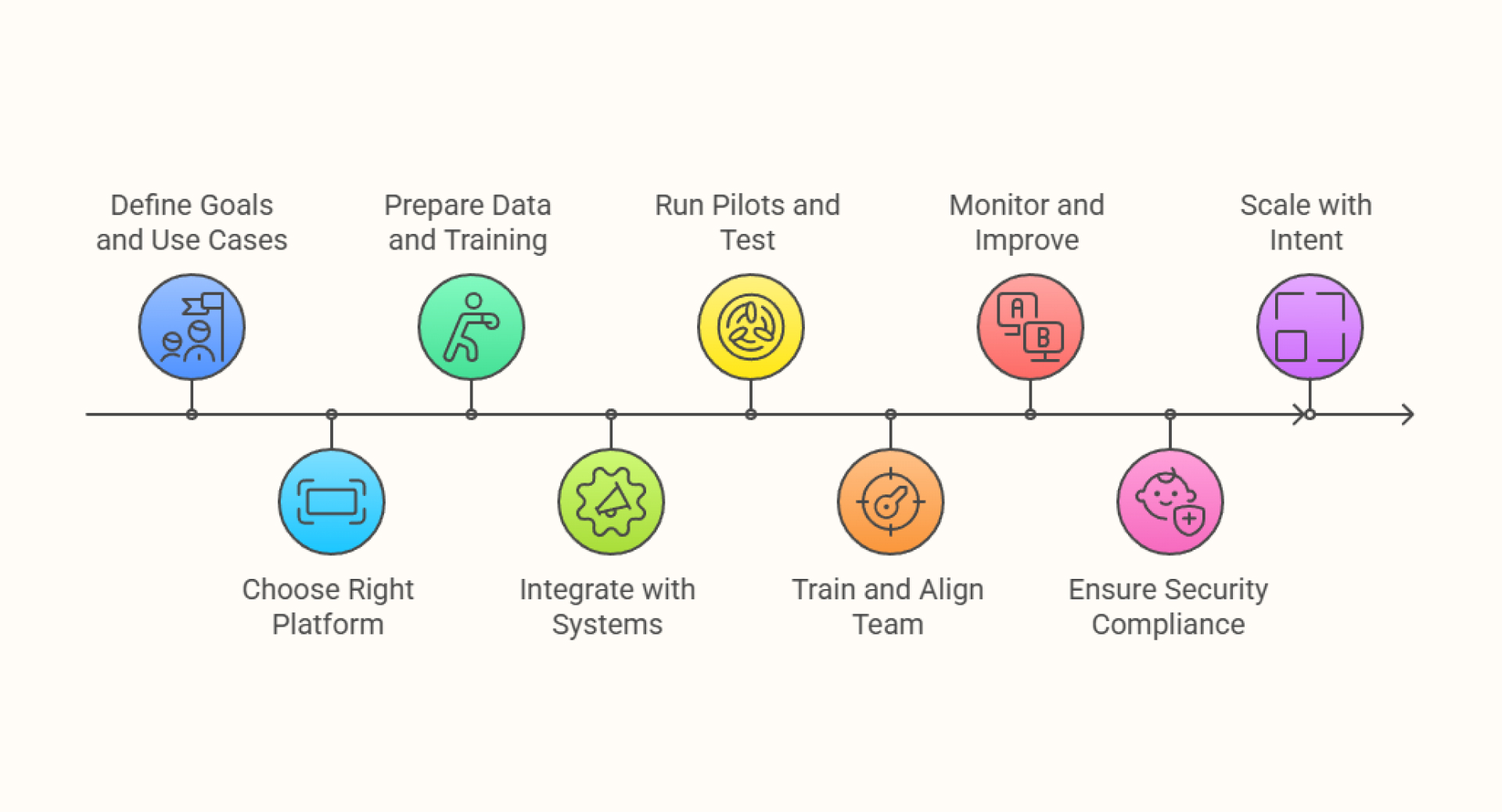
Rolling out AI sales agents takes more than just picking a tool; it requires the right strategy, data, systems, and team alignment to actually drive results.
- Start with clear goals and use cases
Define what you want to achieve, whether it’s automating lead qualification, scaling outreach, or improving CRM hygiene, and identify specific points in the sales process where AI can add measurable value. - Pick the right platform or tool
Choose a solution that fits your use case, integrates with your current stack, supports your channels (email, chat, voice), and meets your security requirements. Some tools work out of the box, while others let you build custom workflows with low-code setups. - Prepare your data and training inputs
Feed the system clean, accurate CRM records, email templates, product info, and real call transcripts. The better the context, the more relevant and on-brand the agent’s outputs. - Integrate with your existing systems
Connect the agent with your CRM, calendar, chat platforms, and any backend workflows that matter. 65% of online retailers already integrate AI agents with CRM systems to streamline customer support and inquiry management. Strong integration ensures the agent has the data and triggers it needs to act in real time. - Run pilots and test thoroughly
Start small with a single use case, like outbound email or demo scheduling. Monitor performance, gather feedback, and fine-tune the agent before expanding to more tasks. - Train and align your team
Prepare reps to work alongside AI, help them understand how the agent fits into the workflow, when to step in, and how to prompt or review outputs effectively. Clear communication reduces resistance and drives adoption. - Keep oversight and improve continuously
Monitor key metrics like response time, lead quality, and conversion rates. Review conversations regularly, update prompts and workflows, and make sure there’s always a way for humans to step in when needed. - Security compliant
Use secure tools, follow data privacy laws (GDPR, CCPA), and clearly communicate to customers when they’re speaking with AI. Build in guardrails to keep the agent’s actions within approved limits. - Scale with intent
Once the first use case is working, expand gradually, adding more touchpoints, workflows, or functions like forecasting, sales coaching, or post-sale engagement.
Conclusion
Sales has always been about building trust, making people feel heard, and showing that someone is genuinely there to help. Customers don’t want to talk to machines; they want meaningful interactions and real support. That’s exactly where AI sales agents come in, not as replacements, but as tools that help sales teams focus more on what truly matters.
AI sales agents aren’t here to replace salespeople; they exist to make teams more efficient, accurate, and productive. By handling repetitive tasks like data entry, lead sorting, and follow-ups, the focus stays where it matters most, building relationships and closing deals.
For businesses, this means better execution, fewer delays, and improved customer experiences, without adding operational burden. Customers benefit too, with faster responses, personalized communication, and smoother handoffs.
Personalization is what gives businesses a real edge, even small teams can now build deeper customer connections and compete with more established players. With AI, personalization at scale is not only possible but accessible, unlocking stronger relationships and more sustainable growth.
As the technology improves, AI sales agents will continue to take on more advanced tasks, connect across systems, and deliver insights that drive performance.
The adoption trend is accelerating the global AI for sales and marketing market is expected to soar from $57.99 billion in 2025 to $240.58 billion by 2030, growing at a staggering CAGR of 32.9%. Businesses that adopt early will be better positioned to grow, compete, and meet new expectations.
Ready to build your own AI sales agent?
This might all sound overwhelming, but it doesn’t have to be. With Thinkstack, you can create a fully personalized AI sales agent that reflects your brand and drives results, without writing a single line of code.
Our easy-to-use visual builder lets you design and deploy custom workflows in minutes, leveraging the intelligence of LLMs like ChatGPT.
Try Thinkstack’s AI in action
Schedule a demoFrequently Asked Questions (FAQs)
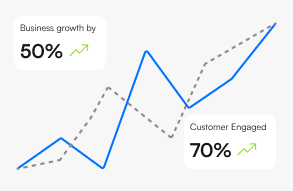
Grow Your Business with AI Agents
- Automate tasks
- Engage customers 24/7
- Boost conversions